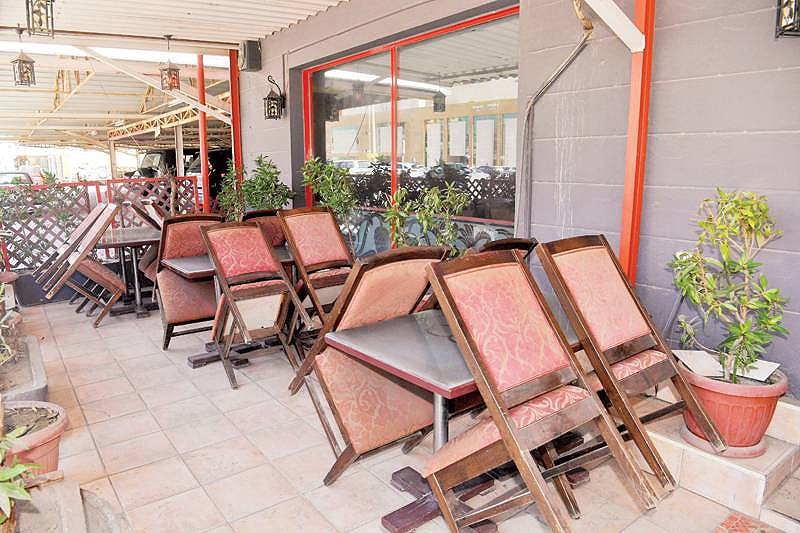06/03/2020
06/03/2020
KUWAIT CITY, March 5: A number of restaurant and café owners have appealed to the government and real-estate owners to intervene to save them from the huge losses they have suffered following the government’s precautionary measures due to the emergence of the new coronavirus, reports Al-Anba daily.
A number of restaurant owners said they are faced with the risk of bankruptcy or closure as a result of the decrease in sales traffic by more than 50 percent in the month of February, which was supposed to be one of the highest selling months in light of Kuwait’s National Day and Liberation Day celebrations.

While the owners of restaurants stressed the need for rapid government intervention before the current crisis becomes more severe and hits one of the most important sectors in the Kuwaiti market, they urged the merchants and owners of commercial and investment real estate about the need to cooperate with them by exempting them from the rents of February and March, within the framework of the necessity for solidarity and support in this critical period, due to the compelling reasons in which they have no hand.

Initially, the owner of the Seventies Restaurants Bader Al-Dabbous said his restaurant sales had decreased by more than 50 percent last month after the spread of the coronavirus news and the precautionary measures taken by the government. He highlighted the significance of public and private sectors’ intervention to help restaurant owners in the current stage.
Al-Dabbous explained that the restaurant owners were building hopes on the sales movement in February, especially since February is usually the best-selling month every year. However, the recent precautionary measures have severely affected the rate of demand for food from restaurants. Kuwaiti Municipality’s decision to prevent “shisha” became “the straw that broke the camel’s back”, because a decision of this kind have affected nearly 3,000 cafés to the core.
He asked, “Who will compensate the owners of these cafés after they stop working?” Al-Dabbous called on real estate owners to join hands with lessors among the owners of restaurants and cafés, as owners of restaurants and small shops may not bear the current losses. He said, “If the owners do not pay attention to the lessors, then an unforeseen crisis may occur, especially in the event that many lessors leaving the market will lead to high vacancy rates for real estate owners”.
Al-Dabbous explained that his company played its national role in this crisis voluntarily, as its restaurants have dedicated to serving workers and volunteers in the first classes of doctors, soldiers and employees, and providing free meals to citizens who are quarantined in Jaber Hospital and Al- Khairan Resort.
This is based on the national responsibility placed on the private sector in such circumstances. This initiative has received commendation from citizens and residents, as well as the desirability of a number of restaurants to take similar steps.
Meanwhile, the owner of a food company Abdullah Jassem Boodai explained that the current problem facing the catering sector is not new.
It is mainly because of the National Fund for Development of Small and Medium Enterprises, which opened the door wide for entrepreneurs to establish restaurant and café projects without conducting serious studies on the market’s need for such projects. Restricting these projects to two craft areas – one in the north and the other in the south – has led to the crisis of restaurants, which have been suffering from high rental values. The situation became worse after being restricted to two specific areas, while more areas were supposed to open to influence the high rental rates.
Risks
Boodai went on to explain that the restaurant market in Kuwait is fraught with many risks, starting with setting the price list for the main grill dishes, and the prices of sandwiches, and opening home licenses that do not bear huge burdens that are borne by restaurants, especially the effect of the current coronavirus.
This predicts the imminence of a major crisis that may be exposed to owners of small and medium enterprises who have financial obligations towards the fund that they may not be able to face in the next stage.
Furthermore, the owner of Doner Restaurant Nawaf Al-Asousi made an urgent appeal to those concerned following the heavy losses suffered by his restaurant located in Khairan area.
He said the presence of a quarantine zone in Khairan area has caused citizens to refrain from visiting his restaurant, which in turn stopped the sales movement permanently during the past two weeks.
Al-Asousi indicated that the rent of his restaurant is KD 800, revealing that the property owner refuses to exempt him from paying the rent under the pretext of his commitment to pay off a bank loan. He stressed the need for government’s intervention by postponing landlord loans, or alleviating their burden by exempting them from electricity and water fees or other solutions that guarantee landlords and lessors to continue their work without any prejudice towards the payment of loans or rents.
Al-Asousi stated that the current period requires the concerted efforts of everyone, including the government and the private sector, for the public good, especially since the current crisis has no income for any party in it, neither from near or from afar. In this regard, the CEO of “Makan” app Ibrahim Al-Tuwaijri affirmed that the restaurant market is currently experiencing a major crisis due to the reluctance of citizens and residents to visit restaurants or order food online, which has led to decrease in the movement of sales and orders by almost 50 percent.
He said the government and traders should appreciate the current conditions and waive the rents for the month of March if they want to keep the lessors, especially since the current crisis is a global one that is beyond the control.
Al-Tuwaijri explained that some owners of restaurants and cafés have given their employees unpaid leave for two weeks with the aim of reducing expenditures at this critical stage, which witnessed a noticeable decline in revenues. The restaurant sector is not the only sector affected by this crisis, as the aviation, hotel and retail sectors are also suffering.
All consumer markets are affected and require the attention of both the state and the merchants. The restaurant market has been suffering from decline for more than six months, but the current crisis has worsened the situation.
A large segment of restaurant owners are owners of small and medium enterprises, and there is a large category of them who are committed to paying monthly installments to Industrial Bank of Kuwait or the Small Enterprise Fund. Therefore, unless there is a quick and urgent view to resolve this crisis, the government will face a major dilemma with this segment, a large percentage of which are expected to declare bankruptcy, especially with the approaching month of Ramadan and the summer holidays.
Al-Tuwaijri concluded by saying that the “Makan” app has presented a special initiative for reducing commissions due on restaurant owners as a step to reducing the costs borne by restaurant owners in order to help them overcome the current crisis.
On the other hand, Chairman of the Board of Directors of The National Incubators Company and the owner of a restaurant Engineer Ali Mubarak had a different opinion.
He says the market for food delivery orders to homes has not been greatly affected by the current crisis, as the current impact is focused on the presence of customers in the restaurants right from the announcement of the virus to the present day, as there has been a significant decline.
Eng Mubarak stressed that the strict measures imposed by Kuwait Municipality on workers in restaurants, including the need to wear masks, have a negative impact on the psyche of customers, as this step led to a decline in the demand for restaurants in light of such precautionary measures, and in fear of contagion.


